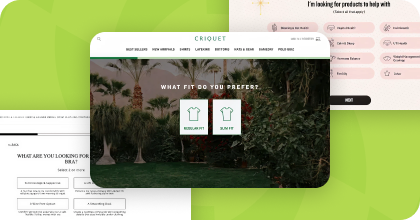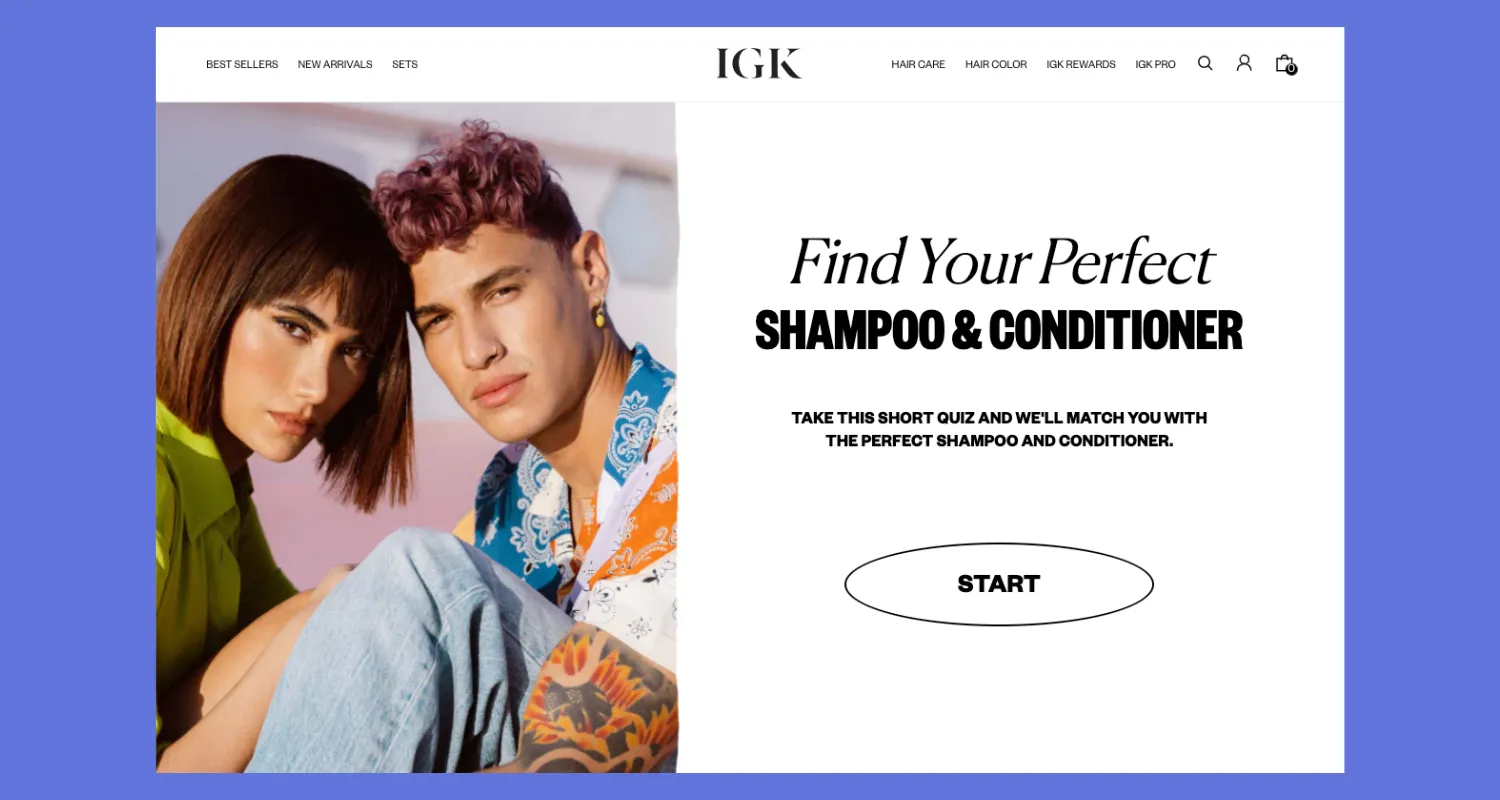May 21, 2025


Steal High-Converting Ideas From Leading DTC Brands
Browse 50+ real examples of personalized marketing funnels you can replicate today.
Personalization is necessary for conversions and customer loyalty. Shopify quiz apps have become powerful tools for merchants to enhance the shopping experience, provide personalized product recommendations, and collect zero-party data directly from customers.
This guide will show you how an interactive quiz on your Shopify store can transform your customer experience, boost sales, and drive real business results, like BedGear, Andie Swim, IGK Hair, and Obvi.
Today’s online shoppers expect personalized experiences. A well-designed Shopify quiz app can help customers navigate your product catalog and find products that fit their needs. Instead of scrolling through endless pages, customers get personalized product recommendations based on their answers.
Take BedGear, for example. This performance bedding brand specializes in sleep solutions that fit consumers based on body type, sleep position, and temperature. Using Digioh’s quiz builder, BedGear created a PillowID quiz that matched customers with their perfect pillow. The result? A 490% increase in conversion rate (CVR)—personalization really works!
For inspiration, explore real quiz examples to see how top brands use interactive quizzes to personalize the shopping experience.

Static product pages don’t engage customers in meaningful ways. Interactive quizzes create an engaging shopping experience that keeps visitors on your site longer and guides them to purchase decisions.
Andie Swim, a brand focused on comfortable, confidence-boosting swimwear, created a personalized product recommendation quiz to help demystify the often difficult process of buying swimsuits online. By asking questions about body type, style preferences and intended use, they created a guided selling experience that boosted customer confidence. The result? 296% increase in conversions and 96X ROI on their quiz investment.
Zero-party data – information willingly shared by customers – is becoming more valuable as third-party cookies phase out. Shopify quiz apps are great at collecting this actionable data while providing value to customers through personalization.
When you create product recommendation quizzes, you’re not just improving the immediate shopping experience – you’re building a foundation for better marketing. The data collected can power email segments, retargeting campaigns and product development decisions that help you serve your target audience better.
Uncertainty leads to cart abandonment. When shoppers aren’t confident in their purchase decisions they’re more likely to leave without buying. A quiz app can provide the guidance to overcome this hesitation.
Obvi, a health and wellness brand focused on collagen supplements, found that their Digioh quiz achieved an impressive 80% completion rate – 80% of customers completed the quiz – compared to 45% with their previous solution.
This engagement resulted in 102% increase in conversion rate for quiz takers compared to their overall conversion rate. By helping customers find the right products for their needs, Obvi reduced decision paralysis and cart abandonment.
You can read the full Obvi case study to see how their quiz strategy unlocked a 102% CVR lift.
Top Features to Look For:
When choosing a quiz app for your Shopify store, look for solutions that integrate smoothly with both Shopify and your email service provider (ESP) and your email service provider (ES). This integration ensures that the customer data you collect is free to your marketing.
Digioh, for example, has native integrations with major platforms like Klaviyo and Google Analytics, so quiz responses can trigger personalized email flows automatically. This connection is key to leveraging your quiz data across multiple platforms.
The best quiz builder apps offer drag-and-drop interfaces that make creating quizzes that match your brand easy. Look for apps that allow you to customize colors, fonts, images, and layouts without requiring technical expertise.
IGK Hair, a cutting-edge haircare brand, prioritized customizability when choosing their quiz solution. "We were looking for customizability. The quizzes we were trying to build were pretty complex so we needed a tool that could handle the mapping and rules we needed," said Johnny Grant, Senior Ecommerce Manager at their agency partner. This focus on customizability paid off with a 30% increase in color sales and a 137% increase in overall conversion rate.

Basic quizzes with linear paths are limited in their effectiveness. To provide truly personalized results your quiz app should support advanced branching logic that adapts questions based on previous answers.
This is especially important for brands with complex product lines or products that require specific fitting considerations. The ability to create complex decision trees ensures customers get truly relevant recommendations that drive sales.
With mobile commerce on the rise, your quiz must perform flawlessly on smartphones and tablets. Choose an app that prioritizes mobile responsiveness and fast loading times to prevent abandonment.
The ability to quickly create and deploy mobile-optimized quizzes without sacrificing site functionality is key to maintaining a good user experience across all devices.
Beyond immediate product recommendations, your quiz app should excel at capturing and organizing customer data for future marketing efforts. This includes integrating with your ESP, CRM and even Facebook Pixel to create segmented audiences based on quiz responses.
BedGear integrated their quiz with Google Analytics and Klaviyo so they could track where people were dropping off in the quiz funnel and feed sleeper attributes directly into their email marketing platform. "For example, let’s say they answer that they’re a hot sleeper. We can send a campaign for the products that help hot sleepers directly to those consumers," explained Thomas Kemp, BedGear’s eCommerce Director.
Unlike other apps like Octane AI, Jebbit or Convertflow, Digioh was built for brands that demand flexibility, performance, and complete data ownership.
Digioh combines the ease of no-code tools with the power of enterprise-grade personalization—no devs required.
Before you build your quiz, establish specific goals. Are you primarily focused on increasing sales, collecting email addresses, reducing returns, or gathering customer insights? Your objectives will shape the questions you ask and how you structure the quiz flow.
For example a quiz designed to reduce returns might focus more on fit and preference details while a lead generation quiz might emphasize value delivery before asking for contact information.
Respect your customers' time by keeping your quiz concise. Most successful quizzes have 5-7 questions that can be completed in under 2 minutes. Each question should move the customer closer to a relevant recommendation.
Obvi’s CEO and Founder, Ronak Shah, said:
"With Digioh, I actually enjoy taking our quiz because it asks the right questions, it’s not too long, and it has a lot of character in it. I really love that."
This approach contributed to their 80% completion rate.
Use images, GIFs or videos to make your quiz visually appealing and engaging. Visuals make the experience more fun and can help clarify questions and answer options.
Interactive elements like sliders, image selection, and animated transitions can further enhance engagement, making the quiz feel more like a fun discovery process than a tedious form. Adding these elements to your Shopify quiz can make customers interact with your website better.### Place Your Quiz Where Your Customers Will See It
Quiz placement matters. Feature your quiz on your homepage, main navigation or category pages where product selection is tough.
Andie Swim tested different quiz placements across their store using Visually and Digioh and saw an extra 4.2% uplift in conversions. That’s the power of thoughtful quiz placement.

Like any marketing asset, quizzes need to be optimised. A/B test different question sequences, wording, visuals and results pages to see what works best for your customers.
Look at quiz performance metrics like completion rate, conversion rate and average order value to measure the impact of your changes and gain customer insights.
Digioh stands out in the Shopify quiz app market with several advanced features to help you create high-converting quizzes:
These features have helped brands in various industries achieve amazing results with their Digioh quizzes as seen in the case studies throughout this article.
The most direct measure of quiz success is conversion rate uplift. Track both overall site conversion rate and quiz specific conversion rate.
For many merchants, quizzes are lead generation tools. Track how many new email subscribers you get from your quiz and measure the quality of these leads based on engagement and conversion metrics.
Andie Swim added over 25,000 new Klaviyo email subscribers through their quiz in 2024 alone.
The long-term value of quizzes extends to customer loyalty. Analyze whether quiz participants have higher retention rates or make more repeat purchases than non-participants.
Obvi found that "customers who come through the quiz have a 14% higher lifetime value (LTV)" so the personalised experience creates more valuable long term customer relationships.
A well-implemented Shopify quiz app transforms your eCommerce business by personalizing the shopping experience, collecting zero-party data, and increasing conversions. As seen with brands like BedGear, Andie Swim, IGK Hair, and Obvi, the right quiz solution can deliver ROI across various industries.
To get started with your own Shopify quiz:
Whether you want to increase sales, reduce returns, or build your email list, implementing a quiz can help you achieve those goals and create a more engaging shopping experience for your customers.
Ready to launch your own Shopify quiz? Book a demo and learn how Digioh’s quiz platform can help you collect data and provide product recommendations that drive results.
Zero consumption based pricing with zero limits allows your brand to deploy Digioh across your entire marketing funnel.
book a demo
